Address
304 North Cardinal St.
Dorchester Center, MA 02124
Work Hours
Monday to Friday: 7AM - 7PM
Weekend: 10AM - 5PM
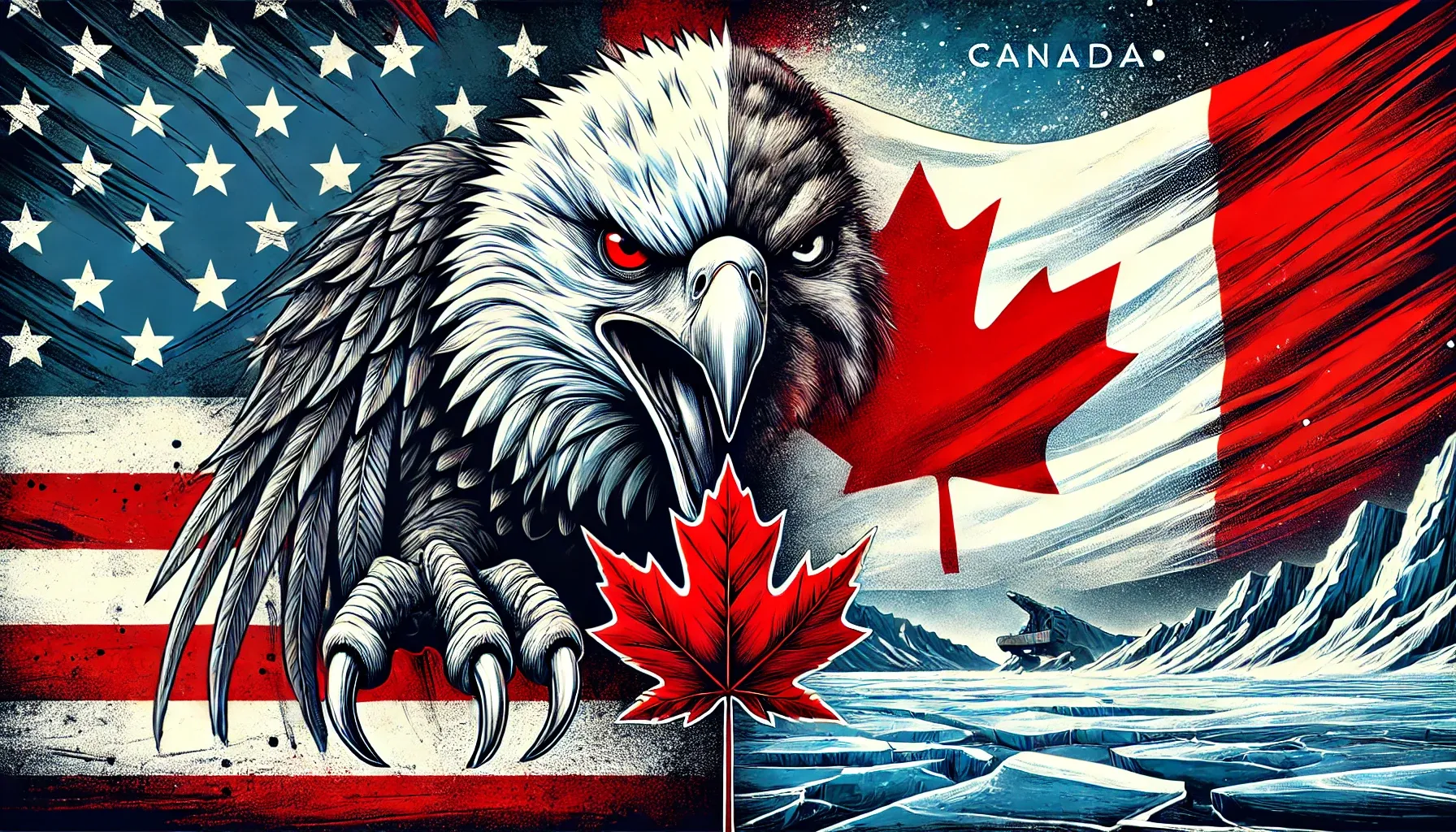
For too long, Canadians have clung to the illusion that the United States is a friend, an ally, and a partner. This belief has persisted despite centuries of evidence to the contrary. From economic coercion to military threats, cultural erasure to political interference, America has never truly respected Canada as an independent nation. The latest surge in American hostility under Donald Trump is not a break from the norm—it is merely a louder and more explicit expression of a long-standing pattern of American dominance over its northern neighbor.
Trump’s recent rhetoric, including threats of economic force, punitive tariffs, and even offhanded suggestions of annexation, should serve as a wake-up call. Canadians are often quick to dismiss Trumpism as an aberration, a temporary sickness within the American political system. This is a mistake. Trump is not the cause of American hostility toward Canada—he is simply its most vulgar and unfiltered manifestation. The same instincts that drive his administration’s aggression have been present in U.S. policy toward Canada for over two centuries. Whether through military invasion, economic manipulation, or cultural absorption, America has never treated Canada as a truly sovereign nation.
History makes this clear. From the War of 1812, when the United States attempted to conquer Canada under the assumption that its people would welcome them as liberators, to the 19th-century belief in Manifest Destiny, which saw Canada as an inevitable addition to American territory, U.S. ambitions toward its northern neighbor have never fully disappeared. Even as direct military threats faded, American economic dominance and cultural imperialism took their place. The Free Trade Agreement (FTA) of 1988 and its successor, NAFTA, ensured that Canada remained economically dependent on the United States. Meanwhile, American media, politics, and business interests have systematically eroded Canada’s ability to maintain a distinct identity.
The current escalation of U.S.-Canada tensions under Trump is not a new conflict—it is simply the latest chapter in an ongoing struggle. If Canadians fail to recognize this pattern, they will remain vulnerable to the next iteration of American expansionism, whether it comes in the form of military pressure, economic blackmail, or political subversion.
This essay argues that Canada must sever its emotional, economic, and strategic dependence on the United States and begin treating it as an existential threat. This argument is built on three key pillars:
Canadians must abandon the illusion of friendship with the United States and recognize that our survival as a nation depends on treating America not as an ally, but as a rival. The sooner we wake up to this reality, the better prepared we will be to defend our sovereignty in the years ahead.
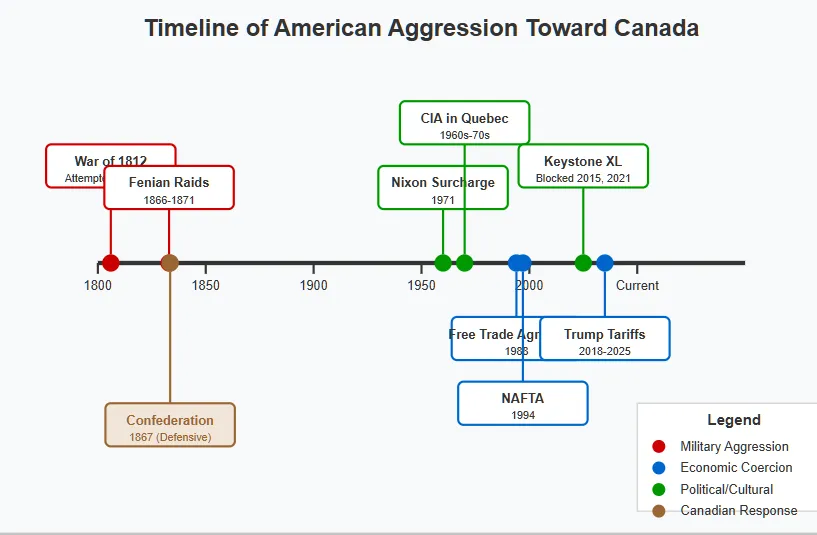
Americans have always viewed Canada as an unfinished project—an extension of the United States that simply hasn’t been integrated yet. This belief has shaped American foreign policy for over two centuries, manifesting in repeated attempts to conquer, annex, or subjugate Canada through military, economic, and political means. The pattern is undeniable: whenever America perceives weakness in Canada, it exploits it. Whenever Canada asserts independence, the U.S. retaliates. From the War of 1812 to modern economic warfare, America has never accepted a truly sovereign Canada.
The first significant attempt at annexing Canada came in 1812, when the United States, emboldened by its expansionist ambitions, launched a full-scale invasion. The American assumption was clear: Canadians, eager to rid themselves of British rule, would welcome the U.S. Army as liberators. This delusion was quickly shattered.
Instead of rising up against the British, Canadian settlers and Indigenous nations fought alongside them to repel the American invasion. The battles of Queenston Heights, Beaver Dams, and Châteauguay showcased a fierce resistance that humiliated American forces. The war ended not with American conquest, but with the burning of Washington, D.C., by British and Canadian forces.
Despite their failure, the Americans did not abandon their belief that Canada should eventually fall under their control. The war reinforced the idea that Canadian independence was an unnatural condition—one that could and should be corrected.
Throughout the 19th century, the ideology of Manifest Destiny—the belief that the United States was divinely destined to expand across North America—kept the dream of annexing Canada alive. While much of the focus was on expanding westward into Indigenous and Mexican lands, Canada was always part of the equation.
American newspapers regularly speculated that it was only a matter of time before Canada joined the Union. Politicians openly discussed annexation, sometimes through diplomacy, but more often through economic or military pressure.
Several key moments highlighted this persistent threat:
It was the persistent threat of American annexation that ultimately drove Canadian leaders to form Confederation in 1867. Canada was not founded out of a natural political evolution, but as a defensive measure against American imperialism. The U.S. reaction? Indifference, with an undertone of expectation that Canada’s independence was a temporary inconvenience.
By the 20th century, outright military conquest became impractical, but economic and political coercion took its place. The U.S. realized that it could achieve its goals through subtler means—by ensuring that Canada remained economically dependent and politically subordinate.
Several examples illustrate this shift:
At every stage, when Canada attempted to assert independence, the U.S. found new ways to pull it back in. By the late 20th century, the United States no longer needed to discuss annexation openly. It had already achieved functional control.
From military invasions to economic coercion, the American approach to Canada has remained consistent. When brute force failed, economic dependency was used. When political subjugation wasn’t possible, cultural imperialism became the tool of choice. The goal has never changed: Canada must not be allowed to exist as a truly independent nation.
Understanding this historical context is critical because it shows that Trumpism is not a break from the past—it is a continuation of an old American impulse. Canada’s belief that the U.S. is a benevolent ally is a dangerous delusion, one that has been systematically disproven at every turn.
If Canadians do not recognize this reality, history will repeat itself. The next American attack—whether economic, political, or even military—will not come as a surprise. It is simply the latest iteration of a war that has been waged for over two centuries.
If the 19th and early 20th centuries were defined by military invasions and political interference, the late 20th and 21st centuries have seen the United States shift to more insidious methods of control. Today, economic coercion and cultural dominance are the primary weapons in America’s campaign to keep Canada subservient. The tools may have changed, but the strategy remains the same: ensure that Canada never truly operates as an independent power.
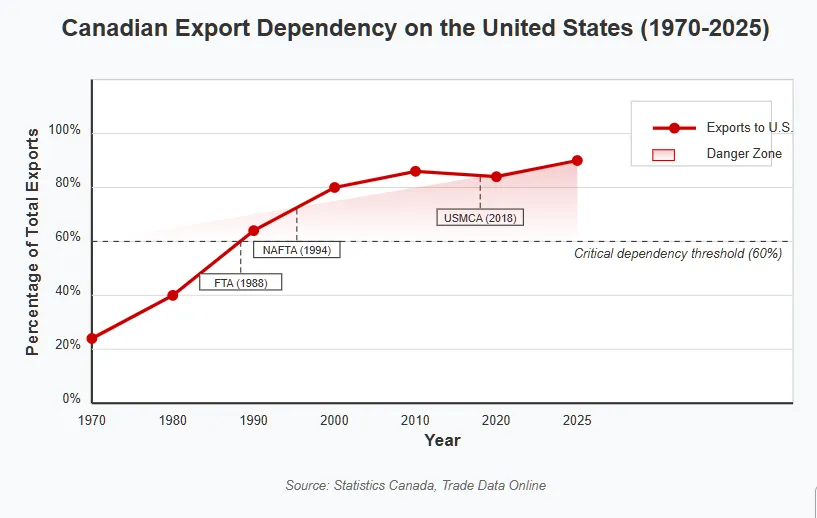
One of the most effective ways the U.S. has maintained control over Canada is through trade agreements designed to cement economic dependence.
The 1988 Free Trade Agreement (FTA) between Canada and the U.S. was billed as a mutually beneficial arrangement, but in reality, it was the beginning of a one-sided economic relationship in which Canada surrendered key industries to American dominance. The FTA led directly to NAFTA (1994), which further entrenched U.S. economic control by:
Trump’s USMCA (2018), which replaced NAFTA, only strengthened America’s ability to dictate Canada’s economic future. The agreement included a provision explicitly preventing Canada from negotiating a free trade deal with China without U.S. approval—an astonishing admission that America sees Canada not as a partner, but as a satellite state.
Whenever Canada attempts to assert economic independence, the U.S. responds with punishment. Trump’s recent tariffs on Canadian steel and aluminum are not about protecting American industry; they are an explicit reminder that Washington can and will weaponize trade whenever it chooses. This is not a temporary Trumpist policy—it is part of a long-term strategy of keeping Canada economically shackled.
While economic control is America’s primary means of maintaining dominance, it is complemented by a deliberate effort to erase Canadian identity through cultural imperialism. The Americanization of Canada is not accidental; it is a calculated strategy designed to make resistance to U.S. influence unthinkable.
This campaign has been waged on multiple fronts:
The result is that many Canadians no longer even recognize that they are being culturally colonized. They consume American media, internalize American political debates, and adopt American perspectives on global issues. This is not harmless entertainment—it is an ideological occupation.
The United States no longer needs to invade Canada with soldiers; it has already conquered the country through economic dependency and cultural domination. Canadians who believe that America is a benevolent ally fail to see the structural mechanisms that keep Canada under U.S. control.
Trump’s tariffs, Biden’s economic nationalism, and the constant pressure for Canada to align with American foreign policy are not isolated events. They are part of a long-term strategy that has existed for decades. Canada is not America’s partner—it is America’s resource depot, economic buffer, and ideological colony.
If Canadians do not recognize this reality and take active steps to break free, they will continue to be at the mercy of an empire that does not see them as equals, but as subjects. The only way forward is to dismantle this system of dependency before Canada’s sovereignty is eroded beyond repair.
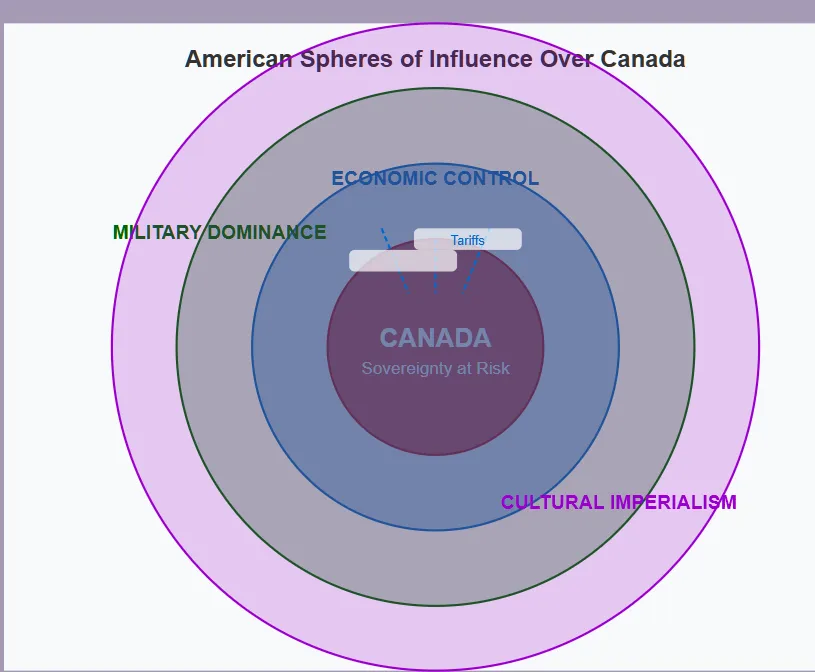
Many Canadians comfort themselves with the belief that Donald Trump is an anomaly—that his belligerence, economic bullying, and outright contempt for Canada are unique to his presidency. This is a dangerous illusion. Trumpism is not a break from American history; it is a manifestation of a deep and enduring American worldview.
From Democratic presidents like Joe Biden enforcing trade protectionism to historical patterns of U.S. interference in Canadian affairs, the reality is clear: America has never accepted Canada as an equal, only as a subject. If Canadians continue to believe that the U.S. is a friendly, cooperative neighbor rather than an imperial power pursuing its own self-interest, they will remain vulnerable to the next, inevitable assault on their sovereignty.
It is convenient to dismiss Trump as a rogue actor, but the truth is that every U.S. administration, regardless of party, has treated Canada as an extension of American power.
At no point in modern history has any American administration, Republican or Democrat, treated Canada as a fully sovereign state. The United States views Canada as a resource hub, a junior partner in military affairs, and a market to be controlled.
Trump simply says the quiet part out loud.
For centuries, American intellectuals and policymakers have discussed Canada not as a permanent neighbor, but as an unfinished project—an extension of the U.S. that has yet to be integrated. This mindset is embedded in American political philosophy.
Even today, U.S. political figures—from Trump to lower-level Republican lawmakers—periodically float the idea of annexation, whether through economic dominance or outright force. While some see this as bluster, it reflects a long-standing American assumption: that Canada’s fate is ultimately tied to American control.
Trump is not the disease; he is a symptom. The real disease is the underlying American belief that Canada is not a truly sovereign nation. This belief has shaped U.S. policy for centuries, and it will continue to shape future American actions, regardless of who sits in the White House.
Canadians must abandon the naïve belief that a change in American leadership will lead to better treatment. The hostility, coercion, and condescension Canada faces from the U.S. are not temporary—they are structural. Canada is not dealing with a rogue president; it is dealing with an empire that has never accepted its independence.
If Canadians do not recognize this reality, they will remain vulnerable to the next wave of economic blackmail, political interference, and cultural erasure. It is time to stop blaming Trump and start seeing the bigger picture. The real enemy is not one man—it is the entire American system.
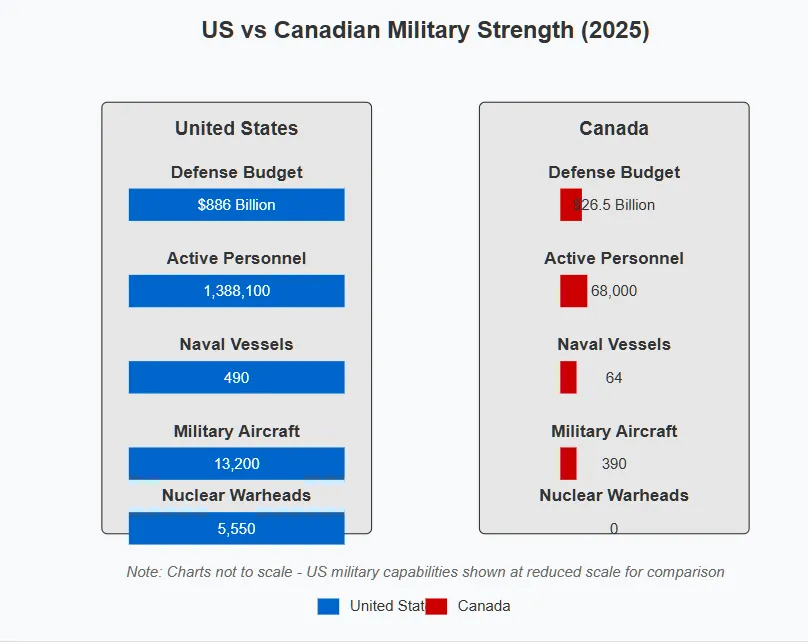
If history has taught Canada anything, it is that the United States will never allow true Canadian sovereignty. From military invasion attempts in the 19th century to economic coercion in the 20th and 21st centuries, American hostility toward Canada is not an accident—it is a strategic reality. The only viable response is for Canada to take decisive steps to break free from American influence, economically, politically, and culturally.
This is not a call for symbolic resistance or diplomatic posturing. It is a call for concrete, structural change to ensure that Canada is no longer at the mercy of American aggression. To achieve this, Canada must:
Each of these steps requires a radical shift in Canadian policy and national identity, but failing to act will only ensure continued subjugation.
The first and most urgent step toward true Canadian independence is breaking economic dependency on the United States. As of today, over 75% of Canadian exports go to the U.S., making Canada uniquely vulnerable to American economic blackmail. The U.S. has repeatedly weaponized this dependence through tariffs, trade restrictions, and threats to cut off key industries. Canada must weaponize critical resources, like its massive potash deposits, to kneecap American agriculture.
To counter this, Canada must:
These steps will not be easy, but they are necessary. As long as Canada remains economically tied to the U.S., it will never be able to act independently.
Canada’s weak military is a national security risk—not because of foreign adversaries like Russia or China, but because of the United States itself. The belief that the U.S. would never turn on Canada is dangerously naive. If Washington ever decided to force its will militarily, Canada’s current defense capabilities would be utterly insufficient.
To counter this, Canada must:
A strong military is not about aggression—it is about survival. The U.S. only respects nations that can resist its influence. A militarily weak Canada is an easy target.
Perhaps the most difficult but necessary change is for Canada to reshape its national identity to reject American influence. This does not mean simple anti-American sentiment—it means a fundamental shift in how Canadians view themselves and their role in the world.
For decades, Canadian leaders have governed under the assumption that America is a “big brother” to Canada. This mindset has led to a passive, submissive approach to diplomacy and domestic policy. To break free, Canada must:
This shift will take time, but without it, Canada will remain psychologically subjugated. As long as Canadians see themselves as a junior partner rather than a sovereign nation, American control will persist.
The final and most important step is a fundamental reframing of the U.S.-Canada relationship. For too long, Canada has viewed the United States as a partner. It is time to see America for what it truly is: a rival power whose interests are often directly opposed to Canada’s.
This does not mean open hostility—it means adopting a realist foreign policy approach that recognizes American actions as threats, not inconveniences. Canada must:
In essence, Canada must act like a country under constant threat—because it is.
The United States is not going to change. The idea that Trump’s departure or a shift in U.S. leadership will improve relations is a fantasy. The real problem is not who sits in the White House—it is the fundamental nature of American power.
The U.S. will continue to pressure Canada economically. It will continue to dominate Canadian culture. It will continue to interfere in Canadian politics. And if necessary, it will use force to assert control.
Canadians can either accept this reality and prepare accordingly, or they can continue to sleepwalk into subjugation. The time for politeness and diplomacy has passed. It is time for Canada to act with the urgency and seriousness that the situation demands.
The U.S. is not a friend. It is a threat. The sooner Canada understands this, the better chance it has of surviving as an independent nation.
For centuries, Canadians have been lulled into a dangerous illusion—that the United States is a friendly neighbor, a natural ally, and a benevolent partner. This belief has persisted despite overwhelming evidence to the contrary. The United States has never respected Canada as a sovereign nation. It has always viewed Canada as an extension of its own empire, a resource depot, a junior partner to be controlled, and if necessary, a territory to be absorbed.
Donald Trump’s open hostility toward Canada—his economic warfare, his annexation rhetoric, his use of trade as a weapon—is not a historical outlier. It is a continuation of a long-standing American strategy. The only difference between Trump and his predecessors is that he is louder about it. The policies he has pursued—tariffs, trade blackmail, military pressure—are the same ones that every U.S. administration, Democratic or Republican, has used against Canada for decades.
Canada must never forgive, and never forget.
The greatest threat to Canadian sovereignty is not American aggression—it is Canadian naivety. The belief that the United States will ever treat Canada as an equal must be eradicated. Every historical lesson, every economic betrayal, every cultural assault, every political interference points to the same conclusion:
At every opportunity, the U.S. has sought to undermine, weaken, or control Canada. And yet, despite this, Canada continues to act as if the United States is a friend. This self-delusion must end.
Canada’s survival depends on decisive, strategic action. The only way to counter American domination is through:
For too long, Canada has operated under the illusion that being polite, cooperative, and deferential would ensure good relations with the U.S. This is a lie. America does not respect politeness. America respects power.
If Canada does not assert its independence with strength, it will be subjugated.
The next chapter of American hostility is already being written. The moment Canada becomes an inconvenience to U.S. interests, the full weight of American power will be turned against it—through economic warfare, political coercion, and possibly even military force. The only question is whether Canada will be ready.
Canadians must never forgive the betrayals of the past. They must never forget the lessons of history. The fight for Canadian sovereignty is not over. It is just beginning.
The time for illusions is over. The time for resistance has begun. No forgiveness. No forgetting. No submission.
[…] which Prime Rogue Inc supports, these demands are also at odds with a united Canadian response to the existential threat to Canada embodied by Donald Trump. As Smith continues to target Ottawa instead of Washington, we must ask whether Smith is a patriot […]
[…] heritage campaigns to Moscow’s historical revisionism – moving in to claim the story. Finally, we turn to Canada’s predicament. Caught between a decaying American mythos and China’s …: Will it become a custodian of multilateral memory, or remain a cultural afterthought in a world […]
[…] Under Donald Trump’s second-term administration, the United States has embraced a doctrine of hostile cultural decoupling through both economic and military means. From tariffs disguised as national security measures to racialized immigration crackdowns and the use of the Alien Enemies Act to justify the indefinite detention of foreign nationals, Canada is no longer treated as a trusted neighbor, but as a strategically inconvenient satellite state that will either become an enemy or the 51st State. The termination of informal Canadian access to the Haskell Library is the clearest symbolic gesture yet that the U.S. is not merely tightening borders—it is redefining its relationships with allies in explic… […]
[…] America crossed another invisible line — the kind you only see in the rearview mirror. Just as Trump has threatened to invade Canada and to pull the United States out of NATO, he is now deploying the authoritarian playbook at […]
[…] The United States is the Primary Threat to Canadian Sovereignty […]
[…] dubious “national security” claims, reigniting economic hostilities. More alarmingly, Trump has publicly suggested that Canada could become the “51st state” — not as satire, but as… Meanwhile, Prime Minister Mark Carney has warned that the Canada–U.S. relationship may be […]
[…] in the current environment—where Cabinet has been dissolved, the United States is openly threatening annexation, and Canada is locked in a deepening trade war wi…—nothing should be considered […]
[…] The BDC did it while Canada is under external pressure from a hostile second-term U.S. administratio…While Canadian innovators face escalating tariffs, territorial threats, and foreign acquisition risk.While early-stage tech—cleantech, AI, quantum, defence systems—hangs on thin capital and thinner margins.BDC’s role was to hold that line. Instead, it walked away. […]
[…] failure.It is a strategic exposure — one that may define the future of the country more than any external threat, including the existential one posed by Donald Trump’s United States, ever […]
[…] real story isn’t Trump annexing Canada. It’s what he’s already annexed internally: independent agencies, oversight bodies, federal […]
[…] statement didn’t happen in a vacuum. It follows Trump’s recent threats — yes, threats — to annex Canada and retake Panama. No one laughed. Not in the administration. Not in the intelligence community. […]
[…] cannot be dismissed. It must be treated as a formal trigger event in national security planning. In the same month, President Trump renewed rhetoric around the annexation of Canada, alongside threats targeting Greenland and the Panama Canal Zone. These are not rhetorical flares; […]
The Canadian building code references a lot of US-based standards for many systems and equipment in a building. Perhaps the code should change to use international standards?
[…] is the problem. Framing the crisis as a response to Trump — to his tariffs, his annexation rhetoric, his coercive negotiating posture — implies that a different American president would produce a […]